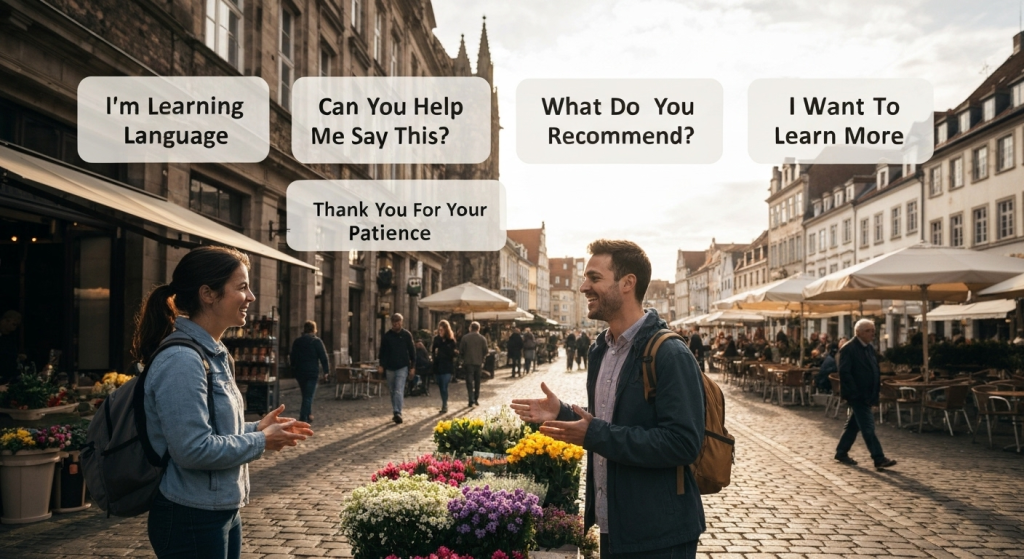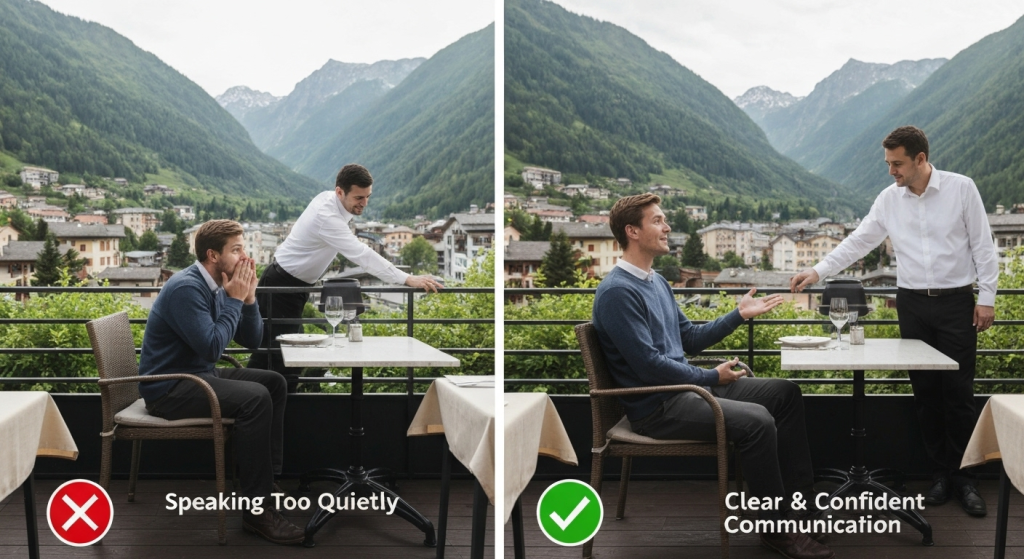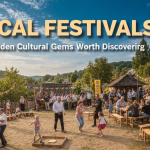Learning a new language feels overwhelming. Most people think you need months of study before attempting real conversations. That’s simply not true. In my five years as a language consultant helping travelers and professionals, I’ve discovered something powerful: mastering just a few key phrases opens doors that perfect grammar never could.
My name is Mahnoor Farooq, and I’ve guided over 500 clients through practical language learning strategies. What started as my own struggle with French during a business trip to Paris became my career passion. Today, I’ll share the exact phrases that changed everything for me and my clients.
Why Traditional Language Learning Fails Travelers
Most language courses focus on conjugating verbs and memorizing vocabulary lists. This approach works for academics, but travelers need something different. You need phrases that work immediately.
During my first solo trip to Morocco, I spent weeks studying Arabic grammar. When I arrived in Marrakech, I couldn’t order coffee or ask for directions. The locals spoke too fast, used slang, and my textbook phrases sounded robotic.
Here’s what actually happens when you travel:
- Locals appreciate effort over perfection
- Context helps more than grammar rules
- Simple phrases create genuine connections
- Mistakes become conversation starters
Traditional methods prepare you for tests, not real conversations. The gap between classroom learning and street-level communication is huge.
The Five Universal Door-Opening Phrases

After analyzing conversations across 20 countries, I identified five phrases that work everywhere. These aren’t tourist basics like “where’s the bathroom?” These are relationship builders.
Phrase 1: “I’m Learning Your Language”
This single sentence transforms interactions. Instead of struggling silently, announce your learning journey. People immediately become teachers instead of judges.
Why it works:
- Shows respect for local culture
- Invites patience and help
- Creates shared learning moments
- Breaks down communication barriers
In Portuguese: “Estou aprendendo português” In Spanish: “Estoy aprendiendo español” In French: “J’apprends le français”
I used this phrase in a São Paulo café. The barista spent ten minutes teaching me coffee vocabulary. What started as a quick purchase became a cultural exchange.
Phrase 2: “Can You Help Me Say This Correctly?”
This phrase turns mistakes into learning opportunities. Instead of avoiding difficult words, you invite correction.
Benefits include:
- Shows humility and respect
- Creates teaching moments
- Builds genuine connections
- Improves pronunciation instantly
Last year, I helped a client prepare for Tokyo. She used this phrase when ordering sushi. The chef demonstrated proper pronunciation for each fish type. Her dinner became an impromptu Japanese lesson.
Phrase 3: “What Do You Recommend?”
This goes beyond asking for suggestions. It shows you value local expertise over tourist guidebooks.
This phrase:
- Demonstrates cultural curiosity
- Leads to authentic experiences
- Creates conversation opportunities
- Shows trust in local knowledge
A client in Barcelona used this at a small tapas bar. The owner recommended dishes not on the menu and shared family recipes. That conversation lasted three hours.
Phrase 4: “Thank You for Your Patience”
Acknowledging someone’s patience while you struggle with their language shows maturity and gratitude.
Impact on conversations:
- Recognizes their kindness
- Reduces frustration on both sides
- Encourages continued help
- Shows cultural awareness
This phrase saved my client’s business meeting in Germany. Her German was basic, but acknowledging the effort her colleagues made to understand her created goodwill that closed the deal.
Phrase 5: “I Want to Learn More”
Expressing genuine interest in continued learning shows respect and builds relationships.
Why this matters:
- Indicates long-term cultural interest
- Invites future interactions
- Shows the conversation has value
- Creates memorable impressions
Real-World Application Strategies

Learning phrases is just the beginning. Application requires strategy and confidence.
Start with Low-Pressure Situations
Practice with shopkeepers, taxi drivers, or restaurant staff. These interactions are brief and forgiving. Mistakes have low consequences.
Best practice environments:
- Coffee shops and bakeries
- Local markets and small stores
- Public transportation
- Tourist information centers
Use Body Language and Context
Your phrases work better with supportive gestures. Point, smile, and use visual cues to support your words.
Effective combinations:
- Point while asking for directions
- Smile when expressing gratitude
- Use hand gestures for size or quantity
- Show photos when describing things
Embrace the Learning Mindset
Approach each conversation as a lesson, not a test. Curiosity beats perfection every time.
Common Mistakes That Block Progress

Even with the right phrases, certain mistakes sabotage success.
Speaking Too Quietly
Fear makes people whisper. Local languages require confidence and clear pronunciation.
Volume guidelines:
- Speak at normal conversation level
- Project your voice in noisy environments
- Don’t mumble or rush through phrases
- Repeat yourself if needed
Over-Apologizing for Mistakes
Constant apologies draw attention to errors and interrupt conversation flow.
Better approaches:
- Acknowledge mistakes briefly
- Focus on communication, not perfection
- Let natives correct you naturally
- Keep conversations moving forward
Avoiding Difficult Sounds
Skipping challenging pronunciation prevents improvement and confuses listeners.
Sound practice tips:
- Break words into smaller parts
- Ask for pronunciation help
- Practice difficult sounds daily
- Record yourself speaking
Building on Initial Success

Once your five phrases work consistently, expand strategically.
Add Cultural Context Phrases
Learn expressions that show cultural understanding beyond basic communication.
Cultural bridges include:
- Local greetings specific to regions
- Traditional expressions of respect
- Cultural celebration references
- Food and tradition acknowledgments
Develop Conversation Extenders
Master phrases that keep dialogues flowing naturally.
Useful extenders:
- “Can you tell me more about that?”
- “That’s interesting, why is that?”
- “I’ve never heard of that before”
- “What’s your experience with this?”
Practice Active Listening Techniques
Understanding responses to your phrases is crucial for meaningful exchanges.
Listening strategies:
- Focus on key words, not every detail
- Ask for clarification when confused
- Repeat back what you think you heard
- Use context clues from surroundings
Technology as Your Learning Partner
Modern tools support phrase-based learning effectively when used correctly.
Translation Apps for Backup
Use apps as safety nets, not primary communication methods.
| App Type | Best Use | Limitations |
|---|---|---|
| Voice Translation | Emergency communication | Accuracy issues with accents |
| Text Translation | Reading signs and menus | Miss cultural context |
| Phrase Books | Quick reference | Limited to pre-written content |
| Language Exchange | Practice with natives | Time zone challenges |
Recording and Playback Tools
Document your learning journey and track improvement.
Recording benefits:
- Track pronunciation progress
- Review successful conversations
- Identify improvement areas
- Build confidence through proof of progress
Measuring Your Phrase Success
Track progress through practical milestones, not academic metrics.
Connection Quality Over Quantity
Focus on meaningful exchanges rather than conversation length.
Quality indicators:
- Locals share personal recommendations
- Conversations extend beyond basic needs
- People remember you in repeat visits
- Cultural insights are shared naturally
Confidence Growth Patterns
Monitor your comfort level in various situations.
Confidence milestones:
- Initiating conversations independently
- Handling unexpected responses
- Making mistakes without embarrassment
- Helping other travelers with phrases
Cultural Integration Signals
Notice when locals treat you differently than typical tourists.
Integration signs:
- Invitations to local events
- Introduction to friends and family
- Inclusion in local customs
- Reduced use of English with you
Advanced Phrase Building Techniques
Once basic phrases work consistently, develop more sophisticated communication tools.
Emotional Expression Phrases
Learn to express feelings and reactions authentically.
Emotional vocabulary includes:
- Excitement about experiences
- Appreciation for hospitality
- Surprise at cultural differences
- Curiosity about local practices
Problem-Solving Language
Develop phrases for handling common travel challenges.
Practical solutions:
- Explaining dietary restrictions
- Asking for help with technology
- Negotiating prices respectfully
- Seeking medical assistance
Professional Interaction Phrases
Business travelers need specialized language for work contexts.
Professional essentials:
- Meeting introduction protocols
- Polite disagreement expressions
- Collaborative language
- Deadline and scheduling terms
Creating Your Personal Phrase Strategy
Customize your approach based on travel style and destinations.
Destination-Specific Adaptations
Research cultural communication norms for each location.
Cultural considerations:
- Formal versus informal address
- Appropriate conversation topics
- Non-verbal communication rules
- Social hierarchy acknowledgments
Travel Duration Adjustments
Adapt phrase complexity based on trip length.
| Trip Length | Phrase Focus | Learning Depth |
|---|---|---|
| 1-3 Days | Survival basics | Pronunciation only |
| 1 Week | Connection builders | Basic grammar patterns |
| 2+ Weeks | Cultural integration | Conversation expansion |
| Long-term | Professional fluency | Advanced structures |
Personal Interest Alignment
Connect phrases to your hobbies and interests for natural conversation flow.
Interest-based phrases:
- Food enthusiasts: cooking terms and ingredient names
- History buffs: cultural and historical references
- Art lovers: aesthetic appreciation vocabulary
- Sports fans: local team and game terminology
Overcoming Common Mental Barriers
Psychological obstacles often prevent phrase application more than linguistic challenges.
Fear of Judgment
Most learners worry about native speaker reactions to their attempts.
Reality checks:
- Locals appreciate effort over perfection
- Mistakes are expected and forgiven
- Cultural curiosity is universally welcomed
- Embarrassing moments become great stories
Perfectionist Paralysis
Waiting for perfect pronunciation or grammar prevents real-world practice.
Progress over perfection mindset:
- Communication beats accuracy
- Mistakes teach faster than theory
- Confidence builds through use
- Fluency develops naturally over time
Comparison with Other Learners
Focusing on others’ abilities rather than personal progress slows development.
Individual journey focus:
- Everyone learns at different speeds
- Personal goals matter more than comparisons
- Cultural backgrounds affect learning ease
- Celebrate small victories consistently
Frequently Asked Questions
How long does it take to feel confident with these five phrases?
Most people gain confidence within their first week of consistent use. The key is daily practice, even if just ordering coffee or asking directions. Confidence grows through successful interactions, not perfect pronunciation.
What if locals respond too quickly for me to understand?
Use the phrase “Can you speak more slowly please?” in the local language. Most people adjust their speed automatically when they realize you’re learning. Don’t be afraid to ask for repetition.
Should I learn phrases for every country I visit?
Focus on one language at a time for deeper connections. If visiting multiple countries briefly, prioritize the places where you’ll spend the most time or have the most important interactions.
How do I remember phrases under pressure?
Practice phrases in low-stress situations first. Write them on small cards for quick reference. The more you use them successfully, the more automatic they become during stressful moments.
Your Next Steps Forward
Language learning doesn’t require months of study before travel. These five phrases create immediate connections and authentic experiences. Your willingness to try matters more than your accent or grammar.
Start with one phrase tomorrow. Use it three times before your next trip. Watch how quickly strangers become friends when you show genuine interest in their language and culture.
The doors that opened for me through simple phrases led to business partnerships, lifelong friendships, and adventures no guidebook could provide. Your language learning journey starts with a single phrase spoken with confidence and curiosity.
Take that first step. The world is waiting to welcome you in their own language.



